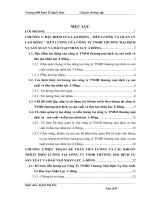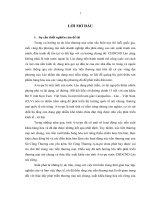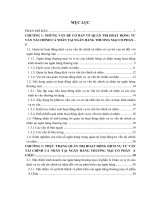Writing a paragraph about air pollution
Bạn đang xem bản rút gọn của tài liệu. Xem và tải ngay bản đầy đủ của tài liệu tại đây (20.1 KB, 2 trang )
Air pollution
1. Causes
- Causes of air pollution: the operation of the factory and traffic vehicles.
- There are many causes of air pollution. Especially the development of production industries,
exploitation of natural resources and the lack of human awareness to protect the environment.
- Some production and living habits of local people causing environmental pollution are: exhaust gas
from production, cooking, littering indiscriminately, letting domestic wastewater flow directly into
the environment ...
- These activities cause serious harm to the environment, affecting the life of animals, plants and
people.
2. Solution
There are many solutions to air pollution
In order to improve air quality and slow climate warming, change needs to happen on a national and
global scale. But actions at the individual and community level are also important.
Burn less coal. Pollution from burning all fossil fuels is harmful to the atmosphere. But, burning coal
has a larger impact on air pollution than burning oil or gas because it releases more carbon dioxide,
sulfur dioxide, and heavy metal pollutants per unit of energy. Also, over one-third of the electricity
produced in the world comes from burning coal. As of 2014, the global demand for coal is beginning
to decline. In North America, coal plants are being replaced by natural gas. Some countries, such as
Japan and South Korea, rely more on nuclear energy, and there is a global increase in electricity
supplied by clean, renewable sources--wind, solar, and water.
Lessen the impact of cars. Cars and vehicles create exhaust full of carbon dioxide, nitrogen dioxide,
and other pollutants. Driving less, in favor of public transportation, biking, or walking, helps decrease
air pollution. Also, using cars with increased fuel efficiency or electric cars that do not rely on fossil
fuels can decrease the amount of pollution we are contributing to the atmosphere. When you use
your car, keep the engine tuned and the tires properly inflated to decrease fuel consumption.
Whenever possible, take fewer trips by combining errands. Many cities are helping by investing in
better, affordable public transportation and developing city plans that include infrastructure for
walking, biking, and public transit.
This is an illustration showing ways that you can help reduce air pollution: wind turbines are a source
of renewable energy; drive low pollution vehicles; choose alternative transportation modes, such as
walking, riding the bus, or riding a bicycle; refueling in the evening; and around the house choose
low VOC products, use less energy, forgo the fire, and mow the grass in the evening.
Conserve energy--at home, work, and everywhere! The demand for electricity, which is most often
produced from burning fossil fuels, has grown exponentially over the past decades. Conserve energy
by turning off lights, buy appliances rated for energy efficiency, and keep the thermostat set higher in
the summer and lower in the winter. Whenever possible, invest in renewable energy sources to
power your home. Several countries are using renewables, nuclear, or lower emission sources like
natural gas to meet their increasing power demand. And many countries plan to significantly
increase their use of renewable energy sources in the future.
Monitor air quality warnings, and take action on poor air quality days. On days when pollution levels
are high, taking action can help reduce the risk of harm to those who are most vulnerable. Reducing
overall car usage, and avoiding idling your car can help on days with high levels of ozone pollution.
Save refueling and use of gas-powered yard equipment for the evening when it is cooler and ozone
levels are lower. On days when particle pollutants are high, avoid burning yard waste and wood.
Choosing to carpool or using a clean transportation method is always helpful, especially on days with
high levels of air pollution. Check on the air quality in your area at the AirNow website.
Take action within your community to find solutions to air pollution. Around the world, many of the
current solutions are the result of communities coming together to demand change. Citizens in
Shenzhen, China, inspired a switch to electric buses in their city. In Brussels, Belgium, a movement
started by parents concerned about poor air quality in schools, led to a plan to invest in public
transportation and cycling, along with a ban on fueled cars by 2030. And in many countries,
governments are closing coal plants and exploring new sources of energy because of citizens who are
concerned about climate warming.
3. writing
Nowdays, air pollution is one of the most serious problems in the world. First of all, we need to
understand what air pollution is? Air pollution is the change in the composition of the air in a bad
direction, or the emergence of strange gases harmful to human health, climate change.. and many
other serious consequences. Currently, the situation of air pollution in the world is exceeding the
safety threshold, becoming a global concern.There are many causes of air pollution such as: exhaust
gas from vehicles and factories, construction sites, gas from burning straw or by people's
consciousness... There are many serious consequences. First, it adversely affects human health,
causes many kinds of diseases, can affect lives. Second, environmental pollution can affect socioeconomic problems of some densely populated countries. Thirdly, environmental pollution affects
the ecosystem such as: greenhouse effect, climate change... Therefore, to protect the human
environment, we need measures such as planting more trees, treating the exhaust gas before being
discharged into the environment, encouraging people to participate in public transport... so each of
us needs a sense and responsibility to protect the world to become more beautiful





